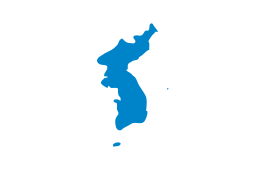President of South Korea
The President of the Republic of Korea (Korean: 대한민국 대통령; Hanja: 大韓民國 大統領; RR: Daehanminguk Daetongnyeong; informally referred to as POTROK or POSK) is the head of state, head of government, head of the Executive Branch of the Federal Government as well as the commander-in-chief of the Republic of Korea Armed Forces.
| President of the Republic of Korea 대한민국 대통령 | |
|---|---|
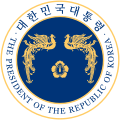 The Presidential Seal | |
 Presidential Standard | |
| Executive branch of the Government of the Republic of Korea Office of the President | |
| Style | Mr. President (대통령님) |
| Status | Head of State Head of Government |
| Abbreviation | POTROK, POSK |
| Member of | State Council National Security Council National Unification Advisory Council |
| Residence | Cheongwadae |
| Seat | Seoul, South Korea |
| Nominator | Political Parties |
| Appointer | Direct popular vote |
| Term length | Five years; Not eligible for re-election |
| Constituting instrument | Constitution of the Republic of Korea |
| Precursor | President of the Provisional Government of the Republic of Korea |
| Inaugural holder | Syngman Rhee |
| Formation |
|
| Deputy | Prime Minister of the Republic of Korea |
| Salary | ₩225,000,000 ($211,000) annually[1][2] |
| Website | (in English) english.president.go.kr (in Korean) president.go.kr |
 |
|---|
| This article is part of a series on the politics and government of the Republic of Korea |
|
|
|
|
The Constitution and the amended Presidential Election Act of 1987 provide for election of the president by direct, secret ballot, ending sixteen years of indirect presidential elections under the preceding two governments. The president is directly elected to a five-year term, with no possibility of re-election.[3] If a presidential vacancy should occur, a successor must be elected within sixty days, during which time presidential duties are to be performed by the South Korean prime minister or other senior cabinet members in the order of priority as determined by law. While in office, the chief executive lives in Cheongwadae (the "Blue House"), and is exempt from criminal liability (except for insurrection or treason).
Moon Jae-in, former human rights lawyer and chief of staff to then-President Roh Moo-hyun,[4] assumed post of President of South Korea on 10 May 2017[5] immediately upon being elected with a plurality of 41.1%, in contrast to 24.0% and 21.4% won by his major opponents, conservative Hong Joon-pyo and centrist Ahn Cheol-soo, respectively.[6]
Powers and duties of the president
Chapter 3 of the South Korean constitution states the duties and the powers of the president. The president is required to:
- uphold the Constitution
- preserve the safety and homeland of South Korea
- work for the peaceful reunification of Korea, typically act as the Chairperson of the National Unification Advisory Council
Also, the president is given the powers:
- as the head of the executive branch of government
- as the commander-in-chief of the South Korean military
- to declare war
- to hold referendum regarding issues of national importance
- to issue executive orders
- to issue medals in honor of service for the nation
- to issue pardons
- to declare a state of emergency suspending all laws or enacting a state of martial law
- to veto bills (subject to a two thirds majority veto override by the National Assembly)[7]
If the National Assembly votes against a presidential decision, it will be declared void immediately.
The president may refer important policy matters to a national referendum, declare war, conclude peace and other treaties, appoint senior public officials, and grant amnesty (with the concurrence of the National Assembly). In times of serious internal or external turmoil or threat, or economic or financial crises, the president may assume emergency powers "for the maintenance of national security or public peace and order." Emergency measures may be taken only when the National Assembly is not in session and when there is no time for it to convene. The measures are limited to the "minimum necessary."
The 1987 Constitution removed the 1980 Constitution's explicit provisions that empowered the government to temporarily suspend the freedoms and rights of the people. However, the president is permitted to take other measures that could amend or abolish existing laws for the duration of a crisis. It is unclear whether such emergency measures could temporarily suspend portions of the Constitution itself. Emergency measures must be referred to the National Assembly for concurrence. If not endorsed by the assembly, the emergency measures can be revoked; any laws that had been overridden by presidential order regain their original effect. In this respect, the power of the legislature is more vigorously asserted than in cases of ratification of treaties or declarations of war, in which the Constitution simply states that the National Assembly "has the right to consent" to the president's actions. In a change from the 1980 Constitution, the 1987 Constitution stated that the president is not permitted to dissolve the National Assembly.
Related constitutional organs
The official residence of the president is Cheong Wa Dae. It means 'the House of the Blue Roof Tiles', so it is also called the "Blue House" in English. The president is assisted by the staff of the Presidential Secretariat, headed by a cabinet-rank secretary general. Apart from the State Council, or cabinet, the chief executive relies on several constitutional organs.
These constitutional organs included the National Security Council, which provided advice concerning the foreign, military, and domestic policies bearing on national security. Chaired by the president, the council in 1990 had as its statutory members the prime minister, the deputy prime minister, the ministers for foreign affairs, home affairs, finance, and national defense, the director of the Agency for National Security Planning (ANSP) which was known as the Korean Central Intelligence Agency (KCIA) until December 1980, and others designated by the president. Another important body is the National Unification Advisory Council, inaugurated in June 1981 under the chairpersonship of the president. From its inception, this body had no policy role, but rather appeared to serve as a government sounding board and as a means to disburse political rewards by providing large numbers of dignitaries and others with titles and opportunities to meet periodically with the president and other senior officials.
The president also was assisted in 1990 by the Audit and Inspection Board. In addition to auditing the accounts of all public institutions, the board scrutinized the administrative performance of government agencies and public officials. Its findings were reported to the president and the National Assembly, which itself had broad powers to inspect the work of the bureaucracy under the provisions of the Constitution. Board members were appointed by the president.
One controversial constitutional organ was the Advisory Council of Elder Statesmen, which replaced a smaller body in February 1988, just before Roh Tae Woo was sworn in as president. This body was supposed to be chaired by the immediate former president; its expansion to eighty members, broadened functions, and elevation to cabinet rank made it appear to have been designed, as one Seoul newspaper said, to "preserve the status and position of a certain individual." The government announced plans to reduce the size and functions of this body immediately after Roh's inauguration. Public suspicions that the council might provide former President Chun with a power base within the Sixth Republic were rendered moot when Chun withdrew to an isolated Buddhist temple in self-imposed exile in November 1988.
Removal
The procedure for impeachment is set out in the 10th Constitution of South Korea in 1987. And according to Article 65 Clause 1, if the President, Prime Minister, or other state council members violate the Constitution or other laws of official duty, the National Assembly can impeach them.
Clause 2 states the impeachment bill must be proposed by one third, and approved by the majority of members of the National Assembly for passage. In the case of the President, the motion must be proposed by a majority and approved by two thirds or more of the total members of the National Assembly, meaning that 200 of 300 members of the parliament must approve the bill. This article also states that any person against whom a motion for impeachment has been passed shall be suspended from exercising his/her power until the impeachment has been adjudicated, and a decision on impeachment shall not extend further than removal from public office. However, impeachment shall not exempt the person impeached from civil or criminal liability for such violations.[8]
By the Constitutional Court Act of 1988, the Constitutional Court must make a final decision within 180 days after it receives any case for adjudication, including impeachment cases. If the respondent has already left office before the pronouncement of the decision, the case is dismissed.
Compensation and privileges of office
| Presidential styles of Moon Jae-in | |
|---|---|
 | |
| Reference style | 대통령님 "Mr. President" |
| Spoken style | 대통령 각하 "Your Exellency" |
| Alternative style | 대통령 "President" |
As of 2018, the president receives a salary of $211,000 along with an undisclosed expense account to cover Travel, Goods and Services while in office.
The Blue House in Seoul is the official workplace and residence of the President and he or she is entitled to use its staff and facilities. The president also has a retreat named Cheong Hae Dae on the island of Geoje which is similar to the US Presidents Camp David although rarely used.
In addition, the presidency of the republic also maintains the Chongri Gonggwan and the Prime Ministers Office in Seoul for use by the Prime Minister of the Republic as his or her official residence and official workplace along with all other official government offices and residences.
The president also has many regional offices especially in the major cities ready to receive the president at any time. Although not residences they are owned by the federal government and are used by the president when he or she is in the region or city.
For ground travel the president uses a highly modified Hyundai Nexo SUV to serve as the Presidential State Vehicle. For air travel the president uses a highly modified plane which is a military version of the Boeing 747-400 with the callsign Code One and a highly modified helicopter which is a military version of the Sikorsky S-92 that serves as the Presidential Helicopter.
- Presidential Amenities
_Reception_Center_0688%269-07_cropped.jpg)
.jpg)
Post Presidency
All former presidents receive a lifelong pension and Presidential Security Service detail; unlike the Prime Minister, he or she cannot decline PSS protection. All former presidents are given a state funeral after death, and a presidential library as a memorial.
Latest election
| Candidate | Party | Votes | % | ||
|---|---|---|---|---|---|
| Moon Jae-in | Democratic | 13,423,800 | 41.08 | ||
| Hong Jun-pyo | Liberty Korea | 7,852,849 | 24.03 | ||
| Ahn Cheol-soo | People's | 6,998,342 | 21.41 | ||
| Yoo Seong-min | Bareun | 2,208,771 | 6.76 | ||
| Sim Sang-jung | Justice | 2,017,458 | 6.17 | ||
| Cho Won-jin | Saenuri | 42,949 | 0.13 | ||
| Kim Min-chan | Independent | 33,990 | 0.10 | ||
| Kim Sun-dong | People's United | 27,229 | 0.08 | ||
| Chang Sŏng-min | Grand National United | 21,709 | 0.06 | ||
| Yoon Hong-sik | Hongik | 18,543 | 0.05 | ||
| Lee Kyung-hee | Korean Nationalist | 11,355 | 0.03 | ||
| Lee Jae-oh | Evergreen Korea | 9,140 | 0.02 | ||
| Oh Young-guk | Economic Patriots | 6,040 | 0.01 | ||
| Invalid/blank votes | 135,733 | – | |||
| Total | 32,807,908 | 100 | |||
| Registered voters/turnout | 42,479,710 | 77.23 | |||
| Source: National Election Commission | |||||
Order of succession
Article 71 of the Constitution of South Korea states, 'In the event of the president not being able to discharge the duties of his/her office, the Prime Minister and ministers in line of the order of succession shall be the acting president.' Article 68 of the Constitution requires the acting president to hold new elections within 60 days.
According to article 12, section 2 and article 22, section 1 of the Government Organization Act, order of succession follows:
- Prime Minister
- Deputy Prime Minister and Minister of Strategy and Finance
- Deputy Prime Minister and Minister of Education
- Minister of Science and ICT
- Minister of Foreign Affairs
- Minister of Unification
- Minister of Justice
- Minister of National Defense
- Minister of Government Administration and Home Affairs
- Minister of Culture, Sports and Tourism
- Minister of Agriculture, Food and Rural Affairs
- Minister of Trade, Industry and Energy
- Minister of Health and Welfare
- Minister of Environment
- Minister of Employment and Labor
- Minister of Gender Equality and Family
- Minister of Land, Transport and Maritime Affairs
- Minister of Oceans and Fisheries
- Minister of SMEs and Startups
List of presidents

Living former presidents
As of 2020, four former presidents are still living (two are imprisoned):
The longest-lived president was Yun Po-seon, who died on 18 July 1990 (at the age of 92 years, 326 days).
The most recent president to die was Kim Young-sam, who died on 22 November 2015 (at the age of 87 years, 337 days).
Relations between presidents
- Park Chung-hee and Park Geun-hye: father and daughter
See also
- Transportation of the President of South Korea
- List of official vehicles of the president of South Korea
- Code One
- Presidential Helicopter of South Korea
- Presidential state car of South Korea
- Air transports of heads of state and government
- Official state car
- List of Presidents of South Korea
- List of Presidents of South Korea by time in office
- Politics of South Korea
- Elections in South Korea
- National Unification Advisory Council
- Prime Minister of South Korea
- List of monarchs of Korea
- Governor-General of Korea
- First Lady of South Korea
- Second Lady of South Korea
- Vice President of South Korea
- List of leaders of North Korea
References
- "IG.com Pay Check". IG.
- Herald, The Korea (16 January 2018). "President's annual salary set at W225m". www.koreaherald.com.
- Article 70 of the Constitution of the Republic of Korea.
- McCurry, Justin (9 May 2017). "Who is Moon Jae-in, South Korea's new president?". The Guardian. ISSN 0261-3077. Retrieved 10 May 2017.
- Sang-hun, Choe (9 May 2017). "South Korea Elects Moon Jae-in, Who Backs Talks With North, as President". The New York Times. ISSN 0362-4331. Retrieved 10 May 2017.
- "Moon Jae-in Elected South Korea's New President". Time. Retrieved 10 May 2017.
- Article 53 of the Constitution of the Republic of Korea.
- "Constitution of the Republic of Korea". Korean Laws in English. South Korean Ministry of Government Legislation. Retrieved 26 December 2018.
External links
| Wikimedia Commons has media related to President of South Korea. |
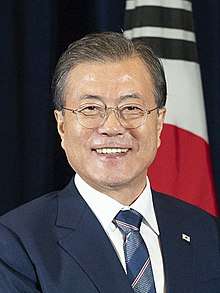

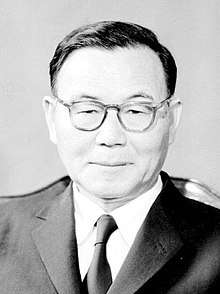
.jpg)

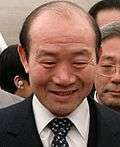
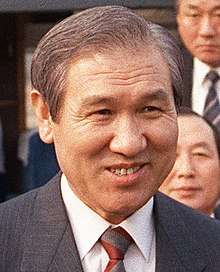


.jpg)
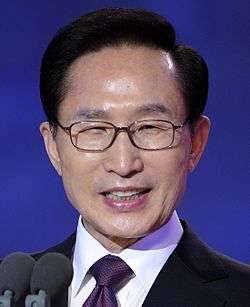
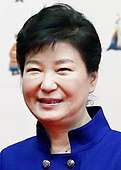
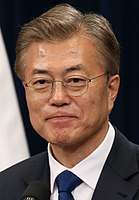
.jpg)

